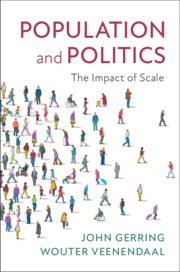Book contents
- Population and Politics
- Population and Politics
- Copyright page
- Contents
- Detailed Contents
- Figures
- Tables
- Preface
- Acknowledgments
- Part I Framework
- Part II Scale Effects
- 3 Cohesion
- 4 Representatives
- 5 Representativeness
- 6 Particularism
- 7 Participation
- 8 Contestation
- 9 Institutionalized Succession
- 10 Professionalism
- 11 Concentration
- 12 Intervention
- 13 Power
- 14 Civil Conflict
- 15 Other Outcomes
- Part III Conclusions
- Book part
- References
- Index
6 - Particularism
from Part II - Scale Effects
Published online by Cambridge University Press: 14 May 2020
- Population and Politics
- Population and Politics
- Copyright page
- Contents
- Detailed Contents
- Figures
- Tables
- Preface
- Acknowledgments
- Part I Framework
- Part II Scale Effects
- 3 Cohesion
- 4 Representatives
- 5 Representativeness
- 6 Particularism
- 7 Participation
- 8 Contestation
- 9 Institutionalized Succession
- 10 Professionalism
- 11 Concentration
- 12 Intervention
- 13 Power
- 14 Civil Conflict
- 15 Other Outcomes
- Part III Conclusions
- Book part
- References
- Index
Summary
Chapter 6 explores the relation between scale and particularism, defined as targeted efforts by politicians to cultivate the support of specific citizens or groups of citizens (aka clients), and the allegiance of those citizens to their leader (aka patron). We begin by sketching a theory of how scale might impact particularism, arguing that scale affects the efficiency of particularistic strategies, politicians’ opportunities to monitor compliance, mutual feelings of obligation between patron and client, and opposition to particularistic politics. On the basis of these assumptions, we expect higher levels of particularism in smaller communities. Next, we examine the question empirically using a variety of indicators including partisanship, targeted campaign expenditures, pork or earmarks, constituency service, vote-buying, clientelism, and corruption. Our analysis tends to confirm the notion that smaller polities, and smaller districts, are especially prone to the development of particularistic ties between leaders and their constituents. We however do not regard extant studies of size and corruption as dispositive. A brief conclusion draws together the results of these analyses.
Keywords
- Type
- Chapter
- Information
- Population and PoliticsThe Impact of Scale, pp. 131 - 159Publisher: Cambridge University PressPrint publication year: 2020

